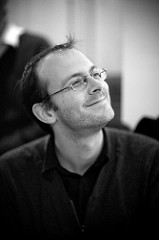Tim Harford is the author of The Undercover Economist.  He is a columnist for the Financial Times and presenter of BBC Radio 4’s More or Less. In this interview with Ashley Lait, he talks about the way he sees economics and reveals something about his approach to the subject.
He is a columnist for the Financial Times and presenter of BBC Radio 4’s More or Less. In this interview with Ashley Lait, he talks about the way he sees economics and reveals something about his approach to the subject.
AL Where did you first study economics?
TH Brasenose College, Oxford. I studied Philosophy, Politics and Economics and later returned to do Oxford’s 2-year Master’s degree in economics, the MPhil.
AL What attracted you to the subject?
TH I was sceptical about the subject at first — philosophy seemed much more interesting — but I was drawn in by game theory. I suppose I loved the odd combination of strategic thinking, mathematics and psychology. At undergraduate level, game theory felt like half storytelling and half puzzle solving. I loved it.
AL What keeps you interested in economics?
TH I think it’s the sheer range of interesting problems. Almost anywhere you turn in economics you need a sense of history, of human behaviour, of mathematical logic, and you can often stir in some physics, biology, complexity science, sociology or anthropology. We’ll never crack these economic problems but we’ll have fun trying.
AL Which economist has influenced you the most, and why is this?
TH Thomas Schelling, I think. He combined some of the characteristics I’ve listed above and was a magnificent writer too. Anyone who can apply economics to global warming and giving up smoking and advise President Kennedy during the Cold War has to be a man to be reckoned with.
AL Did you have any particularly memorable economics teachers, and what made them memorable?
TH I didn’t study economics at school but some of my university teachers were quite brilliant. Tony Courakis and Peter Sinclair at Brasenose originally got me hooked on the subject, as well as giving David Cameron his economics education. Paul Klemperer was my thesis supervisor and a brilliant game theorist who seemed to be calculating every word in a conversation. He later designed an auction that made over £20 billion for the British government. I feel lucky to have had such a remarkable group of teachers.
AL What do you think will be the big, exciting research areas in economics in the next few years?
TH In microeconomics, we are just starting to take advantage of enormous datasets being produced through our use of the internet and mobile phones. They present great opportunities and plenty of headaches too. In macroeconomics, an exciting new set of theories is being developed, with much better models of banking interacting with the rest of the economy — something that was notably absent during the crisis of 2008.
AL Which of your books would you recommend to A-level economics students as a starting point for exploring the application of economic ideas?
TH The Undercover Economist for microeconomics and The Undercover Economist Strikes Back for macroeconomics.
AL If you hadn’t been an economist what career would you have chosen?
TH I didn’t choose my career. There was a lot of luck, the seizing of random opportunities and trying to make the best of each situation as it came along.
AL Do you have any remaining ambitions?
TH Of course. I published my first book at 30 and I am 40 now. It’s a bit early to be stopping. I hope to write more books and make more great radio programmes in future, and who knows what else?
AL Have you taught your children the principle of diminishing marginal utility, e.g. when they eat too many sweets?
TH No, but I do try to involve them in decision making. One of my daughters, who is 7, wanted a system where she received sweets every weekend, but the sweets could be removed as punishments if she was naughty. We’ve followed her advice and it works well.
AL Have you ever got your economic analysis wrong?
TH Of course! The most obvious example was in The Undercover Economist where I argued that Amazon’s business model looked vulnerable to competition. That’s not been totally disproved yet — after all, Amazon still makes surprisingly little money — but it looks pretty dodgy.
AL Which five people (dead or alive) would you invite to your ideal dinner party?
TH Ada Lovelace, the co-creator of the computer. John Maynard Keynes, economist, philosopher and by all accounts brilliant conversationalist. Elinor Ostrom, Nobel laureate, an expert on how human cooperation works. Chinua Achebe, Nigerian author of Things Fall Apart. Deng Xiaoping, the engineer of China’s modern economic growth. I think it’s important to have a large range of perspectives and these five would have plenty to keep each other talking.
» Next post: Game Theory: Two Real World Examples